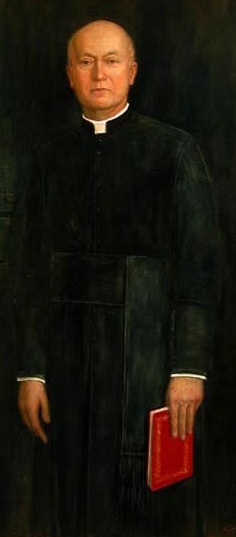 Father George William Rutler
Father George William RutlerFather George William Rutler, a priest of the Archdiocese of New York, is a graduate of Dartmouth and Johns Hopkins and holds advanced theology degrees from Oxford and the Angelicum in Rome (S.T.D.). He is by far the best-known priest at St. Agnes parish in New York City (and probably one of the most famous in the United States). He is a prolific author of books (published by Ignatius Press) and articles. He has made several television series on Mother Angelica's Eternal Word Television Network (EWTN). Tapes of his lectures sell as well as those of any figure in the Catholic world. He is also the chaplain of Legatus, an organization of Catholic CEOs founded by Domino's Pizza Chairman Tom Monahan.
Father Rutler looks like a nineteenth-century English saint--and sounds like one, too, as unlikely as it seems that a boy raised in Patterson, New Jersey would have an Oxbridge accent; it's a consequence of many years of study abroad. Father Rutler used to be an Anglican priest; a distinguished career lay ahead of him in the Episcopal Church. But the Anglican's growing resemblance to the Democratic Party, in addition to theological and spiritual reasons, sent him to Rome in 1980.
Father Rutler is known for many things. He is known for a wicked sense of humor; at an elegant Manhattan fundraising dinner that he emcees every year, he once referred to Msgr. Eugene Clark as "the Mother Teresa to the rich." He is a fine prose stylist; his column appears monthly in Crisis magazine, and his wit has often been compared to G.K. Chesterton's. He is an especially gifted homilist; many people track down his wildly fluctuating Mass schedule in order to be present at one of his three-minute sermons. His programs on EWTN are among its most popular. He is even an accomplished landscape artist.
What Father Rutler is best known for around St. Agnes and New York are his Good Friday sermons. He has inherited the mantle of orator of St. Agnes from Fulton Sheen, who presided over four Good Friday services. Father Rutler has done twelve. Before the church burned, people used to arrive at St. Agnes early in the morning to make sure they got a seat. After the fire, the service was moved to the Grand Ballroom of the Waldorf Astoria Hotel, which has been a godsend. It holds over 1,200 people, and it is standing room only. Starting at 12:00 and ending at 3:00, Fr. Rutler takes the parishioners through the death of Christ on the Cross in his own particular way. One year it was "The Seven Last Words of Christ and the Seven Wonders of the Ancient World." Another compared the seven last words with the seven deadly sins. He delivers seven sermons in those three hours without a note; and then they are published almost verbatim in book form. Hugh Carey, former governor of New York State, recalls: "I was there one year, and it was such a wonderful experience that I ran outside to a pay phone and called all my sons and told them to meet me immediately. They all came. Father Rutler is an amazing priest."
Father Rutler says St. Agnes is important for the atmosphere it creates. "When people enter St. Agnes they know immediately they are entering a sacred space," he says. "But it isn't a stuffy or exclusive place. It is like the Catholic Church as a whole. The Catholic Church leaves room for casual and anonymous curiosity. You can come in, stand around, and get comfortable with it. I am reminded of a sign that Ronald Knox spotted in a Catholic Church: 'Mind Your Umbrella.'" Father Rutler explains that Catholicism is so open that anyone can come in, but that that freedom also includes the thief, or a street person. "A bag lady came up to me one day and quoted something I'd said in a Good Friday service." That's St. Agnes, and Catholicism.
